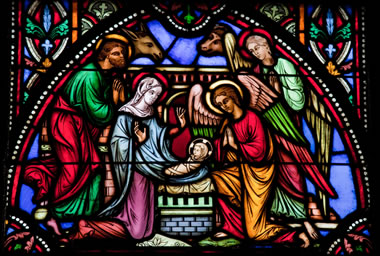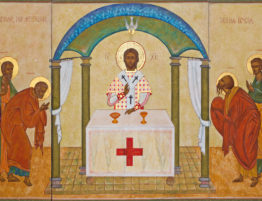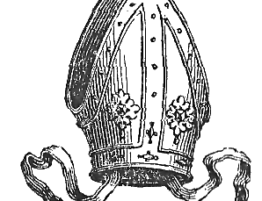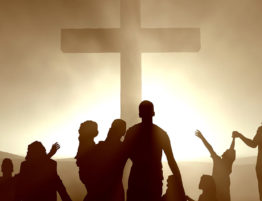
Texts: Matthew 2:19-23, Isaiah 61:1-3
For the last time this season, I’ll be greeting you with “Merry Christmas!” Today is indeed the 12th day of Christmas, the rarely-observed 2nd Sunday After Christmas. Tomorrow is the Feast of the Epiphany, which we’ll be celebrating during its Octave next Sunday.
If you joined us last weekend for our observance of the Feast of the Holy Innocents, you may recall that the Gospel passage spoke to two main events: the slaughter of the Innocents by the wicked King Herod, and the flight of the Holy Family to Egypt in order to escape Herod’s wrath. Today’s Gospel picks up where that passage left off. Please turn in your bibles to the Matthew 2, beginning at the 19th Verse (page 107 in your Prayer Book):
But when Herod died, behold, an angel of the Lord appeared in a dream to Joseph in Egypt, saying, “Rise, take the child and his mother and go to the land of Israel, for those who sought the child’s life are dead.” And he rose and took the child and his mother and went to the land of Israel. But when he heard that Archelaus was reigning over Judaea in place of his father Herod, he was afraid to go there, and being warned in a dream he withdrew to the district of Galilee. And he went and lived in a city called Nazareth, that what was spoken by the prophets might be fulfilled: “He shall be called a Nazarene.”
One of the things we need to remember about St. Matthew’s Gospel is that his primary audience was Jewish, and St. Matthew sought to portray our Lord as the fulfillment of the Old Testament prophecies as the Jewish Messiah. Throughout his account of the Gospel, Matthew will use phrases like “as it was written” or “that what was spoken by the prophets might be fulfilled” when making allusions to the Old Testament Scriptures and how Christ fulfills them. Sometimes, these allusions and prophecies are direct predictions about the Messiah. Other times St. Matthew is much more subtle. Today’s passage is one of the latter.
If you were to pull out your concordance or a bible app’s search engine and look for a specific place where the Old Testament says that the Messiah will be a Nazarene, you won’t find it. There’s no single prophecy that St. Matthew is quoting in our Gospel passage. So, what’s going on with this passage? Was Matthew just making something up? Was he like a bad researcher who’s fabricating references?
Well, for the New Testament authors, as well as for the rabbis, Church Fathers, and other ancient writers, the surface literal meaning of a text isn’t always the only way to approach a passage. One of the most common literary devices is wordplay. We do the same thing with much of our humor today. In Greek, Aramaic, and Hebrew, the word for “Nazarene” sounds similar to a couple of important Old Testament words.
The first of these is the concept of the Nazarite Vow from Numbers 6. In the Old Testament, the Nazarite would vow to abstain from wine, strong drink, haircuts, and dead bodies. Sometimes a Nazarite vow would be for life, such as Sampson, other times it would be for a period of time, such as with young men St. Paul sponsored in Acts 21. Probably the best analogy for us today with the Old Testament Nazarites would be Monks and Nuns in the Church. That is, it is a voluntary vow for a particular separation, holiness, and asceticism. Because of this holiness, several of the Church Fathers concluded that St. Matthew must be referring to Christ’s exceptional and unique holiness, akin to Nazarites or Monks.
The problem, of course, is that Christ’s life, though uniquely holy and sinless, did not resemble that of a Nazarite! His holiness was not that of a separated man. Indeed, he was often accused of being a glutton and a drunkard who hung out with the wrong crowd.
But there is another candidate for the “Nazarene” wordplay, and that is an Aramaic word that means “Branch.” Isaiah, Jeremiah, and Zechariah all include prophecies in which the Messiah is referred to as the “Branch” of David, albeit with a different Hebrew word. According to 19th Century Anglican Priest Alfred Eddersheim, in his classic and definitive work on the 1st Century, The Life and Times of Jesus the Messiah, “the Branch” was one of the favorite titles of the Messiah at that time, including words for “Branch” that were not specifically used in those Old Testament prophecies. In other words, St. Matthew is using wordplay to point out Jesus as the Branch, and therefore the one to whom all the Old Testament prophecies point. Indeed other Church Fathers simply say that “Nazarene” sums up the message of all the Prophets.
With this in mind, our “For the Epistle” reading from Isaiah 61 is particularly profound, as this is the passage that Jesus used to describe his Messianic ministry in his sermon in Luke 4. So, please open your bibles to Isaiah 61 beginning at the 1st Verse (page 106 in your Prayer Book).
The Spirit of the Lord GOD is upon me,
Because the LORD has anointed me
To bring good news to the poor;
He has sent me to bind up the broken-hearted,
to proclaim liberty to the captives,
And the opening of the prison to those who are bound;
The first thing to notice is that the Branch, the Messiah, is sent by the Lord God himself. Sometimes we’ll hear a terrible caricature of the Father’s wrath and Christ’s mediation where the Father is so angry with mankind that the only thing that can satisfy is bloodthirsty temper is his own Son’s death. You may have heard this in terms of the Substitutionary Atonement (that is, Christ dying on our behalf) being described as “cosmic child abuse.”
On the contrary, by using this passage, our Lord himself involves all three Persons of the Trinity in terms of a mission for good news, healing, and rescue. The Father has anointed the Messiah for the mission. The Spirit empowers the mission. The Son, as the Anointed One, the Messiah, carries out the mission.
And what is the mission? To bring good news to the poor, to bind up the broken-hearted, to proclaim liberty to the captives, and opening of the prison to those who are bound. This should remind us of the Beatitudes: “Blessed are the poor in spirit, for theirs is the kingdom of heaven. Blessed are those who mourn, for they shall be comforted…. Blessed are those who are persecuted for righteousness’ sake, for theirs is the kingdom of heaven.”
You see, the Gospel is for those who are needy, for those who cannot save themselves. And lest those of us who are successful or powerful by the World’s standards should be discouraged, Scripture tells us that we are all needy before God. Without the work of Christ, all of us are slaves to our sins, in shackles to the World, the Flesh, and the Devil. All of us are debtors when it comes to righteousness, which should lead to broken hearts when we are confronted with the reality of our sins.
And our Lord Jesus Christ has come to to free us from that slavery, pay our debts, and heal our broken heart, by giving us his Divine righteousness.
Let’s pick up with verse 2
To proclaim the year of the Lord’s favor,
And the day of vengeance of our God;
To comfort all who mourn;
In Jesus’ homily in Luke 4, he ends the passage with the first phrase, and declares that the prophecy is now fulfilled. That said, the rest of the passage is also true in Christ. The Church Fathers and Reformers often see the “year of the Lord’s favor” as an allusion to the Old Testament Year of Jubilee, when the Law required all property to be restored, all captives liberated, all slaves made free. In short, the Jubilee was to be a restoration or a recapitulation of what God has set up. With the coming of the Messiah, we know that the ultimate recapitulation is nigh at hand, as we read in the final chapters of Revelation.
Part of that recapitulation is God’s vengeance, God’s justice on the oppressors. If you read the history of Herod and his family, we see terrible lives and terrible ends. God did indeed repay Herod for his bloodlust and wickedness. Sometimes Christians here in America are very uncomfortable with the idea of God’s justice. I often wonder if that’s because we haven’t seen ourselves as the mourners needing comforting. We haven’t experienced some of the hardships that other Christians experience simply for following Christ. But for those who have indeed been persecuted, whether it’s loss of life at the hands of terrorists in Nigeria, or bakers and florists who have lost their livelihoods for refusing to bow the knee to our nation’s current sexual idols, or Churches that have lost their property for upholding the ethics of the Scriptures, we can count on God to ultimately take care of things. We can ultimately trust God to work his justice, whether in this world or the world to come. God will comfort those who mourn. He will set all things to rights. We will have our Jubilee, because Christ himself is our Jubilee.
Verse 3:
To grant to those who mourn in Zion –
to give them a beautiful headdress instead of ashes,
The oil of gladness instead of mourning,
The garment of praise instead of a faint spirit;
That they may be called oaks of righteousness
The planting of the Lord, that he may be glorified.
Not only has the Messiah come to comfort the mourners, but to exchange their mourning for glory. Instead of dust and ashes he gives a party hat, new suit, and spa treatment. In other words, Christ is not only going to make things right, he’s also going to make things better.
I think we all have something inside us that longs for “the good old days,” especially those of us drawn to more traditionalist expressions of worship like we practice at All Saints. We know that in many ways things have gotten worse, and nostalgia is a natural response. The thing is, the “good old days” were never quite as good as we remember or as good as we imagine. They also had serious problems that are all-too-easy to forget. What we’re really longing for is something even better than the “good old days.” We’re really longing for the best of where we’ve been, the best of now, and an idealized future.
In the same way, when we picture our Lord’s coming as a return to Eden, we’ve actually sold the vision short. The Messianic mission is even greater than a return to Eden. No, with the coming of the Messiah, we have the promise of the restoration of Earth as well as the coming of Heaven. Even now, the line between Heaven and Earth is sometimes blurry (like during Holy Communion) because God the Son has become one of us. In the same way, Heaven will come to Earth and the World to Come will even be better than Eden. In Eden, man had the potential to sin (and indeed did sin). In the World to Come, that will not be the case. We will be healed of even the temptation to sin. Our nature will be perfected because the Perfect One has taken upon himself our nature.
Over the last 12 days, if you’ve followed along with the feast days, readings, and other traditions of the Church, you’ve seen the Christmas Story, the Incarnation of Christ from several angles. We’ve seen the Word become Flesh in John’s Gospel. We’ve seen the Angel come to the Blessed Virgin Mary, St. Joseph, and the Shepherds. We’ve seen our first Martyrs glorifying God even as they are slain for their faith. We’ve seen our Lord taking on the Law for us and giving us his Holy name in his circumcision. And today we’ve seen the summary of the Messianic mission to proclaim good news to the poor, free the captive, and comfort the mourners. The light of the world has come.
In today’s Collect, we addressed God as the one “who hast poured upon us the light of thine incarnate Word” and prayed that “the same light enkindled in our hearts may shine forth in our lives.” May we spread the light we received this Christmastide to a world that desperately needs its Savior.
In the Name of the Father and of the Son, and of the Holy Ghost. Amen.




